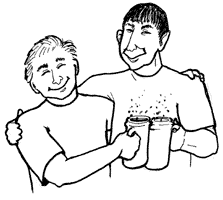>> Back to The HooK front page
STRANGE BUT TRUE- That tasty tingle
Published 07/04/02 in issue #22 of The Hook
BY BILL SONES AND RICH SONES, PH.D.

--DRAWING BY DEBORAH DERR
Q: What is it about beer that makes it such a favorite? Is it the taste? Gas tingle? The alcoholic buzz? Fact is, some people seem to like nonalcoholic beer. Are they just kidding themselves? B. and J. Bush
A: Beer appeals on lots of levels: 3,000 measurable flavor components, refreshment, sociability, and the shared memories of the 'ol gang interfrothed with the mild euphoria of an altered state, says Florida International University brewing scientist and marine biologist Christopher Brown.
All right, make that mild-to-riotous euphoria, if you include spring break. And you should know, J. and B.
Subtler reasons for humankind's 5,000-year-old buddy-movie with beer include its nutritional value (amino acids, nucleotides, many vitamins) and safety: alcohol and hops inhibit pathogens, "so beer can be consumed safely even inthe grossest, most reeked-out places-- like Manila and my friend Ken's basement." And there is the unique herbal effect of hops. Oh, yes.
"I asked a psychiatrist friend of mine what is the deal with nonalcoholic beer. She explained that nobody actually likes it, but it is sometimes important not to have alcohol but always important to have beer."
Q: The longest word in the English language, as many a school kid will tell you, is "antidisestablishmentarianism." So, what's wrong with the school kids? N. Webster
A: They're only repeating what they've been repeatedly told. The actual longest word in most unabridged dictionaries is the 45-letter tongue-twister "pneumonoultramicroscopicsilicovolcanoconiosis," a lung disease caused by the inhalation of very fine silica dust, says Ohio State University linguist Richard Janda, co-editor of the forthcoming Handbook of Historical Linguistics.
Lucky for the kids, this won't be on any spelling tests, nor will the previous length-winner of the 20-plus volume Oxford English Dictionary (OED),"floccinaucinihilipilification" (29), meaning "the action or habit of estimating something as worthless."
Lucky too for the spellers, English is not one of those "poly-synthetic" languages, says Janda, with huge numbers of prefixes and suffixes that add increments of meaning practically limitlessly, and with words commonly growing as long as English sentences.
By the way, according to the OED, antidis... means "Properly, opposition to the disestablishment of the Church of England."
From the kids' point of view, at least the word's pronounceable, right up there with that old Mary Poppins non-OED favorite, supercalifragilisticexpialidocious (34).
Q: We humans are certainly groupies. Do the groups we belong to bring out the best or the worst in us? M. Jagger
A: Cuts both ways, of course. In groups, egged on by others, we become more stressed and tense, mentally error-prone and given to rowdiness, says David G. Myers in Social Psychology. In group discussions, our views tend toward polarization, fostering mutual hostility and suppressed dissent. "No wonder," he writes, "we celebrate those individuals-- minorities of one-- who, alone against a group, have stood up for truth and justice. Groups, it seems, are baaad."
Yet like our ancient ancestors, together we lean on one another for support and sustenance, often accentuating each other's positives, as when in groups we run faster, laugh louder, give more generously. Teamed up in self-help sessions, alcoholics kick the bottle, the obese lose weight, the depressed gain spirit. Out of devout communings, healthy souls may grow.
"We had, therefore," concludes Myers, "best choose our group influences wisely and intentionally."
Send STRANGE questions to brothers Bill and Rich at .
#
>> Back to The HooK front page
|